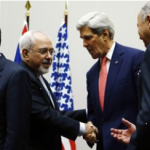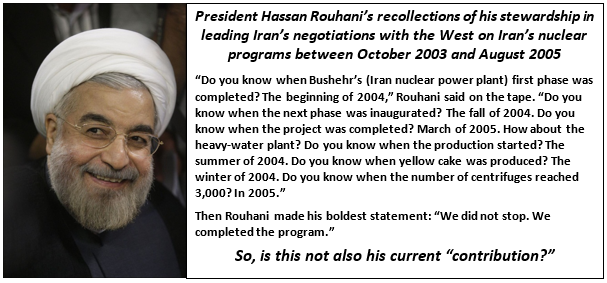“Iran has talented engineers and the necessary financial resources, and its nuclear infrastructure is much larger than what it actually needs. Therefore, a monitoring scheme that is merely ‘good enough’ will not guarantee success in preventing Iran from breaking out and achieving a nuclear weapons capability.” … Olli Heinonen, Former IAEA Deputy Director-General for Safeguards.
This warning from a March 28, 2015 Washington Institute Policy Analysis by Olli Heinonen is most timely in considering the unfolding events in Switzerland as the U.S. delegation led by Secretary of State John Kerry seeks to close another “deal to make a deal” with Iran. Heinonen, a senior fellow at Harvard University’s Belfer Center for Science and International Affairs is most qualified to make pertinent assessments from his over 20-years service with the International Atomic Energy Agency (IAEA) from which he retired as former Deputy Director-General for Safeguards. Together with Washington Institute fellow Simon Henderson, he coauthored the recently updated Policy Focus Nuclear Iran: A Glossary of Terms, a joint publication of the Institute and the Belfer Center.
A brief reading of these two analyses should cause one to pause when evaluating the merits of the unfolding negotiations in Switzerland—and for our future interests in the Middle East, in particular with our ally, Israel. In short, the record of Iran’s adherence to its agreements does not provide much if any confidence that agreements from the current set of negotiations will be worth the paper on which they are printed.
Reuters reported Saturday that the top U.S., French, German and Iranian diplomats had begun meetings In Switzerland, hoping to break an impasse by midnight today as major powers and Iran closed in on “a 2- or 3-page accord that could form the basis of a long-term deal.” If this Reuter’s report is correct, the already controversial deal, scheduled to be announced by midnight today, will not the final deal—it will at best be “the basis” of some additional “long-term deal” that has been reported to be due by the end of June. Some suggest that these negotiations are mostly about the U.S. seeking to persuade its skeptical French and German allies to go along with concessions to Iran’s positions, to close a deal that President Obama hopes will be a signature accomplishment of his second term.
From a broader perspective, these negotiations, after nearly 18 months and delays that twice “kicked the can down the road,” are now alleged to provide at some future time the promised accord whereby Iran halts sensitive nuclear work in exchange for the lifting of sanctions—with the ultimate aim of reducing the risk of a war in the Middle East. This sounds like a recipe for yet another delay, especially in view of Britain’s Foreign Secretary Phillip Hammond’s hint last Friday that the deadline might be extended by two weeks to April 14, after the U.S. Congressional Easter Recess. Nevertheless, Secretary of State John Kerry cancelled his plans to return to the U.S. on Sunday and stayed in Switzerland seeking to complete the interim deal by the March 31 deadline.
On Sunday, Iran backtracked on its previous commitment to send a large stockpile of uranium to Russia. Presumably for these and other reasons, Israeli officials reiterated their concerns over the emerging deal, warning that the reported terms would not do enough to prevent Iran from developing nuclear weapons. Israeli Prime Minister Benjamin Netanyahu declared that his understanding was that the deal was far worse that he had anticipated—presumably worse than what he described as a bad deal in his address to a Joint Session of Congress on March 2nd. Click here for a video of that memorable speech.
Interior Minister Gilad Erdan, a top member of Netanyahu’s Likud party, said that while Western powers and Iran may be about to shake hands on an agreement in the coming days, there could still be time to influence the terms of the final deal, due by the end of June: “It’s true that a deal is close, and there is a chance that an agreement on basic principles will be reached in the coming days, but until the final agreement, which is supposed to be signed with Iran by the end of June, there are still a wide range of diplomatic options. If, God forbid, it happens, Israel will also be required to reassess the whole resulting security situation.”
Intelligence Minister Yuval Steinitz, a confidant of Netanyahu, said the deal was “full of holes,” and he hoped U.S. President Barack Obama would keep to his word that “no deal is better than a bad deal.” Steinitz, in an interview with Army Radio, noted that Iran hadn’t provided adequate explanations to the UN’s nuclear watchdog over the nature of its previous nuclear research.
That actually is an understatement, since Iran has a longstanding record of violating its agreements—and in some cases managing an ambiguous advance of suspicious activities in its pursuit of nuclear weapons. For example, consider the Congressional Research Service’s April 28, 2014 report, Iran’s Nuclear Program: Tehran’s Compliance with International Obligations.
On the eve of the current talks, an important March 27 Washington Post editorial recounts multiple recent Iranian failures to live up to its commitments. Consider its initial jarring opening statement: “As the Obama administration pushes to complete an agreement-in-principle with Iran on its nuclear program by Tuesday, it has done little to soothe concerns that it is rushing too quickly to settle, offering too many concessions and ignoring glaring warning signs that Tehran won’t abide by any accord.”
See Michael Rubin’s testimony on Iran’s non-compliance history and why the President’s diplomatic initiatives with Iran should not be given the “benefit of the doubt,” as has been suggested by Secretary of State Kerry. This concern was also reflected by James S. Robbins, writing in the March 26, 2015 USA Today, that “The U.S. is always wrong on Proliferation.” He backed up his claim with a number of important specific failures, and emphasized that “We can’t be sure when Iran is a year away from the bomb.”
U.S. Congressmen and Senators have spoken out and written to Iran and the President on their concerns. On March 9, Senator Cotton (R-AR) sent a sound though controversial letter, co-signed by 46 of his colleagues, to warn Iranian leaders that the Senate has a voice in international agreements, and their misgivings could cut short the commitments of the current administration. (Click here for the letter and signatories.) And 367 House members, a veto-proof bipartisan majority, sent a March 20 letter to the President stating their concerns with the “grave and urgent” issues involved in the Iranian nuclear negotiations, which are supposed to wrap up this evening. Notable among their bottom lines was that: “In reviewing such an agreement, Congress must be convinced that its terms foreclose any pathway to a bomb, and only then will Congress be able to consider permanent sanctions relief.”
Speaker Boehner no doubt reflected their views when he expressed his doubts in a CNN interview on Sunday: “We have got a regime that’s never quite kept their word about anything; I just don’t understand why we would sign an agreement with a group of people who, in my opinion, have no intention of keeping their word.”
Yesterday’s Washington Post carried an important article aptly entitled, “The Iran Time Bomb” in which Olli Heinonen (referenced in beginning this article) joined former CIA Director Michael Hayden and Ray Takeyh, a senior fellow at the Council on Foreign Relations. Their warning about the likely difficulties in monitoring Iran’s compliance with any agreement should be heeded. As they conclude:
“In the midst of all the typical Washington political cacophony about the progress of the negotiations, what is lost is that an accord between the United States and Iran would be the most consequential arms-control agreement of the post-Cold War period. It would determine the level of stability in the Middle East and impact global nuclear nonproliferation norms. With stakes so high, we need a national debate about the nature and parameters of any agreement. The right venue for that debate is the halls of Congress. No agreement can be considered viable or enduring without such legislative approbation.”
Yesterday, the full P5+1 (members of the UN Security Council—the U.S., Britain, France, Russia and China—plus Germany) convened to continue to press toward completing a deal by this evening. We won’t know the details until this deal is completed—and the most important details are likely to be deferred to the promised outcome of yet another to-be-completed-agreement some months hence. Hopefully, we will learn what concessions have been made to achieve the ambiguous terms of the expected 2-3 page agreement.
Press accounts this morning noted that Russia’s Foreign Minister Sergie Lavrov said in Moscow (where he apparently had more pressing business than the negotations in Lausanne) that there was still a good chance there could be an agreement later today—and he would return in that happy event.
If “press leaks” as of this writing turn out to be true and there is an agreement this evening, it no doubt will leave Iran with advanced centrifuges and various facilities––reportedly, at least 27––for producing nuclear materials and weapons. Iranian concessions, such as limiting the number of centrifuges, will count for little if key sites such as Fordo and other sites devoted to missile development and other military applications remain off limits to IAEA inspectors. Never mind those we don’t know about and possible “unknown-unknowns,” as discussed in our March 3, 2015 message.
Furthermore, the reported agreed date certain when the agreement ends means only that we have provided the recipe for Iran to get the bomb—if they don’t already have it.
For another recap of the discouraging current situation with more information on how we arrived at this point, see Bruce Thorton’s “The Obama-Iran Deal: Recipe for a Disaster,” published yesterday by FrontPage Magazine.
Why does this matter to us?
I urge you to read the March 20, 2015 Investor’s Business Daily editorial, “Obama Invites Iranian Nuclear EMP Attack on U.S.” A nuclear armed Iran is an existential threat to the “Great Satan” United States as well as the “Little Satan” Israel.
As the IBD editorial states, Iranian supreme leader Ayatollah Khamenei boasted last month of Tehran’s achievement in enriching uranium to the 20% level, while his followers chanted, “Death to America.” A nuclear armed Iran will give them the capability to carry out this threat.
Moreover as I joined several colleagues to write several weeks ago, Iran may already have that capability.
Prime Minister Netanyahu told Congress a few weeks ago that this is a bad deal—and he now says it is worse than he thought. But this should not be a surprise. As I wrote in my September 24, 2013 message, Hassan Rouhani was elected Iran’s President to replace the bombastic Mahmoud Ahmadinejad who often declared the goal of destroying America to repeat his earlier feat of delaying our intervention while the centrifuges grew in number and capability.
President Rouhani’s own comments on his 2003-2005 progress, summarized above, made explicitly clear the purpose of his previous negotiations and his strategy—and provided insight for his anticipated charm offensive, again to gain time needed for Iran to complete the nuclear material processing for Iranian nuclear weapons.
Rouhani called Iran’s widely publicized claim that it stopped its nuclear program in 2003 a statement for the uneducated and admitted that the program not only did not stop, it significantly expanded during and after his tenure as Chief Negotiator. By 2005, there were over 3000 spinning centrifuges, reported to be growing to some 19,000 today. And reports are that U.S. concessions will allow Iran to keep many of them and to continue improving their processing capability.
As the talks broke yesterday and as noted above, the Russian representative left saying he would return today only if an accord is in sight—and USA Today noted five remaining hurdles to be overcome if there is to be an agreement by midnight (Swiss time) today, associated with: Lifting sanctions; Nuclear fuel stockpiles; Centrifuges; Bunkered nuclear sites; and Inspections. This mornings report referenced above indicated that settling the “sanctions” issue was the sticking point . . . whatever . . . stay tuned.
Sounds like Rouhani’s recipe again to kick the can is alive and well . . . in one way or another. Such a deal!!!
Near Term High Frontier Plans.
Given our current vulnerabilities and the lack of responsiveness by the Washington “powers that be,” such concerns encourage us to redouble our efforts to inform state and local authorities about the EMP threat and expand our work with the National Guard to help them gain knowledge and workable plans to help harden the grid and counter the EMP threat. This work should go hand in hand with the efforts to gain support from State legislators to expand on the excellent work in Maine and Virginia, which have passed legislation requiring serious studies of the EMP threat and the needed countermeasures to protect the electric power grid.
In particular, we will continue working with South Carolina folks to build a coalition to engage constructively with private citizens and their local and state representatives and other authorities to work with the SC National Guard in understanding and responding to this serious threat. We will expand this effort to neighboring and other states. We expect support from Cong. Jeff Duncan (R-SC) whose district includes my SC farm—who is a member of the Congressional EMP Caucus seeking legislation to counter the EMP threat.
We will be working with members of the EMP Coalition and others who are seeking to take our message across the country—especially with Bob Newman, a former Adjutant General of Virginia to help us link our SC plans more broadly and especially into the National Capital region.
What can you do?
Join us in praying for our nation, and for a rebirth of the freedom sought, achieved and passed to us by those who came before us.
Help us to spread our message to the grass roots and to encourage all “powers that be” to provide for the common defense as they are sworn to do.
Begin by passing this message to your friends and suggest they visit our webpage, www.highfrontier.org for more information. Also, please encourage your sphere of influence to sign up for our weekly e-newsletter.
Encourage them to review our past email messages, posted on www.highfrontier.org, to learn about many details related to the existential manmade and natural EMP threats and how we can protect America against them. I hope you will help us with our urgently needed efforts, which I will be discussing in future messages. Click here to make your tax deductible gift. If you prefer to mail a check, Please send it to 500 North Washington Street, Alexandria, VA 22314.
E-Mail Message 150331
Please click here to read Past Weekly Updates!
Please help High Frontier continue this important and timely work!
 Be sure to follow us on our Social Sites!
Be sure to follow us on our Social Sites!
![]()
![]()
![]() If you found this letter via our Social Sites, and you would like to subscribe, please click below!
If you found this letter via our Social Sites, and you would like to subscribe, please click below!





